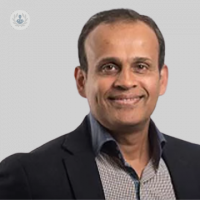What happens when a splenectomy is required?
Written in association with:The spleen is an important part of the body’s immune system but it’s possible to be removed without problems, especially if it’s causing them. Issues such as a rupture and enlargement may spring to mind when considering splenectomies but infection, cancers and blood disorders can also cause it to be taken out.
Mr Joseph Varghese, leading consultant general surgeon and specialist in upper GI and laparoscopic (keyhole) surgery, provides an informative guide to the splenectomy for people who may need to undergo the procedure.

What is the function of the spleen?
The word spleen comes from ancient Greek. The spleen has an important function in the red blood cells (erythrocytes) and the immune system function. It recycles iron, removes old red blood cells and holds a reserve of blood. This reserve can be valuable in the case of haemorrhagic shock.
The spleen removes bacteria and blood cells via blood and lymph node circulation. It also synthesizes antibodies in its white pulp. The spleen is a centre of activity of the mononuclear phagocyte system and is like a large lymph node. Absence of spleen causes a susceptibility to certain infections. Creation of red blood cells and the ability to produce lymphocytes makes the spleen a hematopoietic organ.
Why would you have your spleen removed?
A splenectomy is performed for a variety of diseases and conditions:
- Ruptured spleen
This is the most common cause of a splenectomy.
- Splenic rupture
This could be due to a severe abdominal injury or because of an enlarged spleen (splenomegaly). The result may be life-threatening, causing internal bleeding and haemorrhagic shock.
- Enlarged spleen
Splenectomy may be done to ease the symptoms of an enlarged spleen, such as pain and fullness of the abdomen.
- Blood disorder
Blood disorders that may be treated with splenectomy include idiopathic thrombocytopenic purpura (ITP), polycythaemia vera and thalassemia. Other treatments to reduce the symptoms of these disorders are attempted before splenectomy is performed as a final option.
- Cancer
Cancers that may be treated with splenectomy include:
- Chronic lymphocytic leukaemia
- Hodgkin's lymphoma
- Non-Hodgkin's lymphoma
- Hairy cell leukaemia
- Infection
If it doesn’t respond to other treatment, severe infection or the development of a large collection of pus surrounded by inflammation (known as an abscess) may require removal of the spleen if it does not respond to other treatment.
- Cyst or tumour
If they become large or are difficult to completely remove, noncancerous cysts or tumours inside the spleen may require splenectomy.
- Diagnosis
Removal of the spleen may occur to help diagnose a condition.
What are the consequences of a post-operative splenectomy?
Long-term risk of infection can occur. After spleen removal, there is a risk of serious or life-threatening infections. It is recommended that patients are vaccinated against pneumonia, influenza, Haemophilus influenzae type b (Hib) and meningococci. It is also recommended that you take preventive antibiotics, especially if you have other conditions that increase your risk of serious infections.
What is life like without a spleen?
Other organs take control of the functions previously performed by the spleen after splenectomy. While you can be active without a spleen, you are at higher risk of getting sick or getting serious infections. The risk is highest shortly after surgery. Recovery from an illness or injury may be more difficult for people without a spleen. It could be a good idea to wear a medical alert bracelet, which indicates you don’t have a spleen.
Can you provide travel advice for people without a spleen?
Patients are advised to take a course of antibiotics if they are travelling abroad. It’s also recommended they check the need for any travel vaccinations. The risk of developing a severe form of malaria is increased for people without a working spleen.
Is life expectancy an issue for people who have had a splenectomy?
The majority of spleens are removed for trauma. The life expectancy is dependent on the other injuries sustained.
In patients with other conditions requiring splenectomy, the life expectancy is dependent on their comorbidities, such as malignancy or leukaemia, etcetera.
Are you concerned about having a splenectomy or experiencing conditions that could lead to one? Mr Varghese can offer his expert service. Visit his Top Doctors profile in order to arrange an appointment with him.


